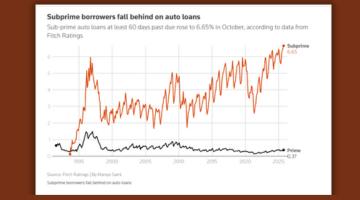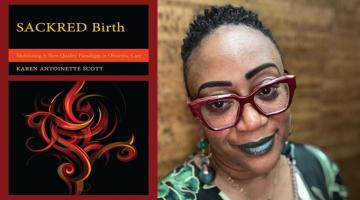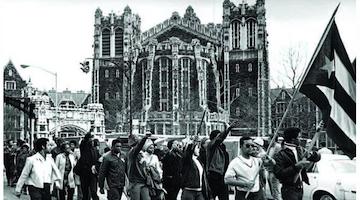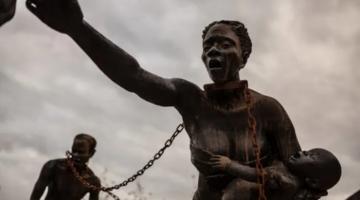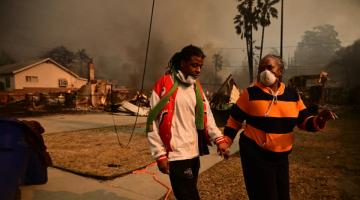In this series, we ask acclaimed authors to answer five questions about their book. This week’s featured author is Tracie Canada. Canada is the Andrew W. Mellon Assistant Professor of Cultural Anthropology at Duke University. Her book is Tackling the Everyday: Race and Nation in Big-Time College Football.
Roberto Sirvent: How can your book help BAR readers understand the current political and social climate?
Tracie Canada: The world of intercollegiate athletics is rapidly changing and has undergone significant recent shifts, especially since the start of the coronavirus pandemic in 2020. Discourse dealing with injury, politics, pay, and protest have all affected the field of play, specifically challenging the college football landscape in a way that speaks to issues that matter way beyond sports.
Tackling the Everyday focuses on the lived experiences of Black college football players, as I consider how college football harms and impacts the Black players who are overrepresented in the sport that sustains the entire college sport system. Though this book is not an explicit statement about the current state of intercollegiate athletics, I discuss the ways that labor, exploitation, race, violence, care, and kinship matter for these Black men, as they navigate their experiences on the gridiron and in the real world away from it. These athletes live in particular bodies that are built up for the sport, yet are stereotyped as threatening and dangerous when they remove their uniforms and helmets. Billions of dollars are also wrapped up in this system that depends on Black male athletic labor, even though profits flow away from those who actually participate in football play.
An analysis of this unique, dualistic experience allows for a robust conversation about how anti-Blackness, structural violence, racialized exploitation, and capitalist accumulation impact Black college football players’ experiences with the sport and with each other. Additionally, there is room for a conversation about how everyday Black folks are navigating oppressive and anti-Black systems that actively enact violence and harm. As I think about the connections between blackness, labor, bodies, exploitation, violence, dehumanization, joy, life, connection, kin, and care, I consider this work to be a contribution to the myriad of works concerned with the predicament of Black life in the US.
What do you hope activists and community organizers will take away from reading your book?
This book is based on almost a decade’s worth of ethnographic research, as I spent time with Black college football players to learn about their everyday lives. During a period that was marred by everything from Colin Kaepernick’s kneeling protests in the NFL, to pandemic football play, it became clear that I write about a population that is simultaneously hypervisible and invisible in public narratives about the most popular sport in the US. While there seems to be abundant information available about these athletes, I often find these media representations to be limited to certain athletes with certain marketable stories. I hope that readers of my book take away different and new perspectives about the lives of Black players. If we shift the frame to say that success for these athletes is not to make it to the professional league, but is instead to live a playful, loving, full life with their friends and family, what comes up in a study of young Black men who also happen to be college football players?
Because my scholarly interest in college football has nothing to do with how successful a team or player is on the field, I draw attention to the plantation logics and racial capitalism that organize and undergird the sport at this level. Uniformity, control, standardization, surveillance, disciplining, and intense regimenting of players’ time, dress, speech, behavior, and food actually make up the foundation of participation in the sport. These are all administrative actions that make players legible to the football system as laboring bodies that are able to produce on behalf of their institutions. With this in mind, my object of inquiry became the intimacy that bounds Black players’ relationships with each other and with others, particularly their mothers, as they attempt to navigate this anti-Black, exploitative, and patriarchal sporting system.
We know readers will learn a lot from your book, but what do you hope readers will un-learn? In other words, is there a particular ideology you’re hoping to dismantle?
There are two main ideas I hope to dismantle. The first is that the pervasive ‘football team as family’ narrative is much more damaging than it seems. This language is invoked in sporting spaces to encourage the trust, closeness, and security that accompanies an idealized family dynamic, hoping then that the football players on the team will create a bond with their teammates. However, I analyze this narrative as an administratively-driven tactic meant to motivate football players to risk their bodies, health, and well-being on behalf of their football family members. This idea is not about the relationships that players form, but instead about how they can be manipulated to perform on behalf of the team.
The second idea I hope to unravel is that these college athletes actually embody the ‘student-athlete’ moniker and receive a free education. I don’t use the term ‘student-athlete’ at all in my writing because this attachment to amateurism in college is a fallacy meant to protect the NCAA, rather than the athletes themselves. The amount of time devoted to sporting activities, the physical toll on the body, and the lack of compensation for athletes are just some reasons why their alleged amateur status contradicts reality. Further, the ‘free’ education they are guaranteed with a scholarship is a broken promise. Considering the time and energy they devote to playing football, these athletes are often encouraged into majors that best fit the sport schedule, miss classes in order to make games, have little time to participate in extracurriculars like clubs, recreational sports, and study abroad, and have limited opportunities for internships and networking to prepare for careers away from football. They have completely different experiences than other students on a college campus and some opportunities are completely foreclosed.
Therefore, I hope my work encourages readers to rethink these two common narratives about college football to better recognize the ways that Black athletes are particularly harmed by them.
Which intellectuals and/or intellectual movements most inspire your work?
I am continually inspired by those who are writing about the mundane, textured reality of Black folks’ everyday lives, and this interest knows no disciplinary or genre bounds. This is an interdisciplinary work that draws inspiration from anthropology, sociology, Black studies, gender studies, sports studies, and American studies, with novels, poems, songs, and memoirs also making appearances in my citations. However, there is a Black feminist bent that connects all of my work.
While I entered this ethnographic research interested in how Black football players manage their time in an exploitative athletic system, the work evolved into a statement about how these players receive, navigate, and reciprocate different forms of care and kin that arise throughout this system. By thinking in community with Black feminist anthropologists like Irma McClaurin, Aimee M. Cox, Savannah Shange, Riché J. Daniel Barnes, Kathryn Mariner, Maya Berry, and Chelsey R. Carter, I was interested in the various caring masculinities that Black players exhibited; where Black women appeared and were important in this hypermasculine space; and how my own positionality as a young Black American woman researcher mattered in this space.
This book takes on kinship and care as important analytics for Black football players, given their mothers, their teammates, their universities, their teams, and their coaches all offer varying levels of support backed by multiple motivations. I believe I could only be attended to these dynamics because of my Black feminist orientation.
Which two books published in the last five years would you recommend to BAR readers? How do you envision engaging these titles in your future work?
There have been so many great books published recently that consider the implications of athletes’ racialized experiences and take readers across different sports, different temporalities, and different global locations. However, I will take this opportunity to bring attention to two 2025 books written by Black feminist scholars.
Letisha Brown’s Say Her Name: Centering Black Feminism & Black Women in Sport centers Black women and girls to challenge the pervasive interconnectedness of issues like white supremacy, capitalism, transphobia, racism, patriarchy, misogynoir, poverty, as experienced by these athletes, in particular. Courtney M. Cox’s Double Crossover: Gender, Media, and Politics in Global Basketball uses the crossover metaphor to consider how Black women and non-binary basketball athletes tackle a sporting industry, and its subsequent media landscape, that was not meant to support them. Both books do an excellent job of using a Black feminist lens to study the mundane and often overlooked aspects of a Black woman athlete’s experience, considering the ways that power, patriarchy, and misogyny come into play.
Also, be on the lookout for forthcoming books from Javier Wallace, Amira Rose Davis, and Samantha White. Their works will make important contributions to the qualitative study of race and sport, as they theorize gender, inequality, youth, labor, and anti-Blackness from different disciplinary perspectives. With the 2026 World Cup and 2028 Summer Olympics both with sites in the United States, these are important considerations for our present and future moments. These books will not only provide historical and contemporary accounts of the experiences of Black athletes to highlight the intricacies of these experiences, but will also question and challenge the structural implications of globally-impactful sporting institutions.
Roberto Sirvent is the editor of the Black Agenda Report Book Forum.


